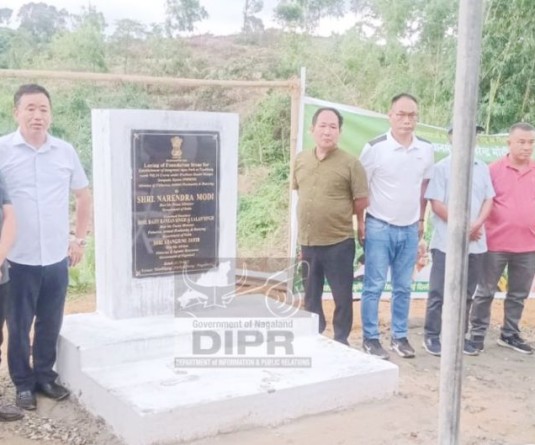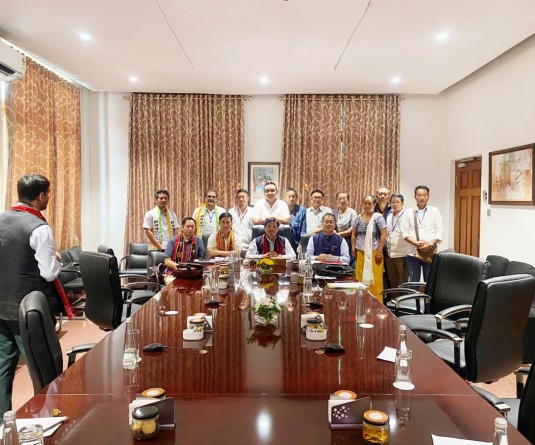
Says not in interest of Naga people to explore or extract petroleum products at this juncture
Dimapur, December 19 (MExN): The Working Committee, Naga National Political Groups (WC, NNPGs) today stated that the issue of petroleum reserve is a key area of Indo-Naga political negotiations.
In this connection, it asserted that exploring or extracting petroleum products independently or in collaboration with any company “at this juncture” will not be in the interest of the Naga people.
“It will be a big hindrance and an impediment to the impending solution. The special status and privileges of Nagaland state, the identity of the Nagas, as a whole, will be compromised,” stated the WC, NNPGs in a press release from its Media Cell.
Further stating that the WC, NNPGs is “very clear that the long term interest of the Naga people is all that matters,” it called upon the government of the day to desist from “gnawing away at the core issues of Indo-Naga settlement.”
“The time is not right for the state government to frame a policy on extracting petroleum resources,” it asserted.
“WC, NNPGs is very clear that all natural resources belong to the people and will be utilised after the GoI (Government of India) and Nagas officially announce acceptable and honourable political solution.”
Agreed Position not ‘shrouded in mystery’
The WC, NNPGs further maintained that the negotiated “status paper, either in part or whole, is not shrouded in mystery.”
From the very first round of political negotiations between the WC, NNPGs and GoI in the latter half of 2017, there have been tremendous consultations among the Naga tribes in what is best for the Naga people, it said.
The Agreed Position set the parameters of the negotiations, it noted.
To this end, the WC, NNPGs informed that every elected representative in the Nagaland State Legislative Assembly has a copy of the negotiated status paper.
“The same is also with apex tribal bodies and all stakeholders because the issue and matter is of the Naga people, by the Naga people and for the Naga people.”
Meanwhile, divulging further on the details of ongoing talks, the WC, NNPGs informed that as per the negotiations, a “bicameral legislature called the Tatar Hoho would emerge.” It would comprise of “representatives from all indigenous Naga tribes and non-Naga Indigenous stakeholders in the Upper House based on Naga customary system known as the ‘Nagaland Federal Hoho’ or the ‘House of Elders,’ perpetual in succession” and a Lower House called the "Leacy Hoho" whose members shall be elected democratically through adult suffrage.
The principles of "Mutual co-existence” will thus begin, fulfilling the tenets of the Agreed Position between the GoI and Nagas, it said.
The Tatar Hoho would have absolute legislative powers on all subjects enumerated under “Land and its Resources” in accordance with the practices and procedures of Naga customs and traditions, it noted.
While admitting that the physical integration of Naga people and their ancestral land cannot happen at the moment, the principle of honourable and acceptable honourable solution will be applied to Naga areas in Manipur and Arunachal Pradesh, the WC, NNPGs maintained.
The Nagaland-Assam boundary issue would be settled through “neutral high powered commission,” derived from Indo-Naga political agreement. Till such time an effective administrative system come into force, it said.
Against this backdrop, WC, NNPGs asserted that exploration or extraction would not be in the interest of the Naga people.
While appreciating the role of the Nagaland State Government as facilitators in the Indo-Naga political dialogue, it stressed that the “focus must continue on facilitating the genuine political transformation, ending the long Indo-Naga conflict through political solution.”
“Exploration of oil and natural gas on the eve of political solution must be avoided,” it added.
It further stated that the 'Agreed Position' signed on November 17, 2017, between the GoI and WC, NNPGs, has “sufficient legal and constitutional provisions to safeguard the land, political and historical identity of the Nagas.”
To this end, it argued that it is the responsibility of every sensible Naga leader to ensure that “future generations do not suffer for the blunders committed today.”
The WC, NNPGs also cautioned against injecting “politically motivated venom into the veins of our people,” saying that the Nagas must “preserve and protect (the) people's natural resources.”
It further appealed the people to be vigilant against oil prospectors, terming them “insatiable, remorseless profiteers.”





